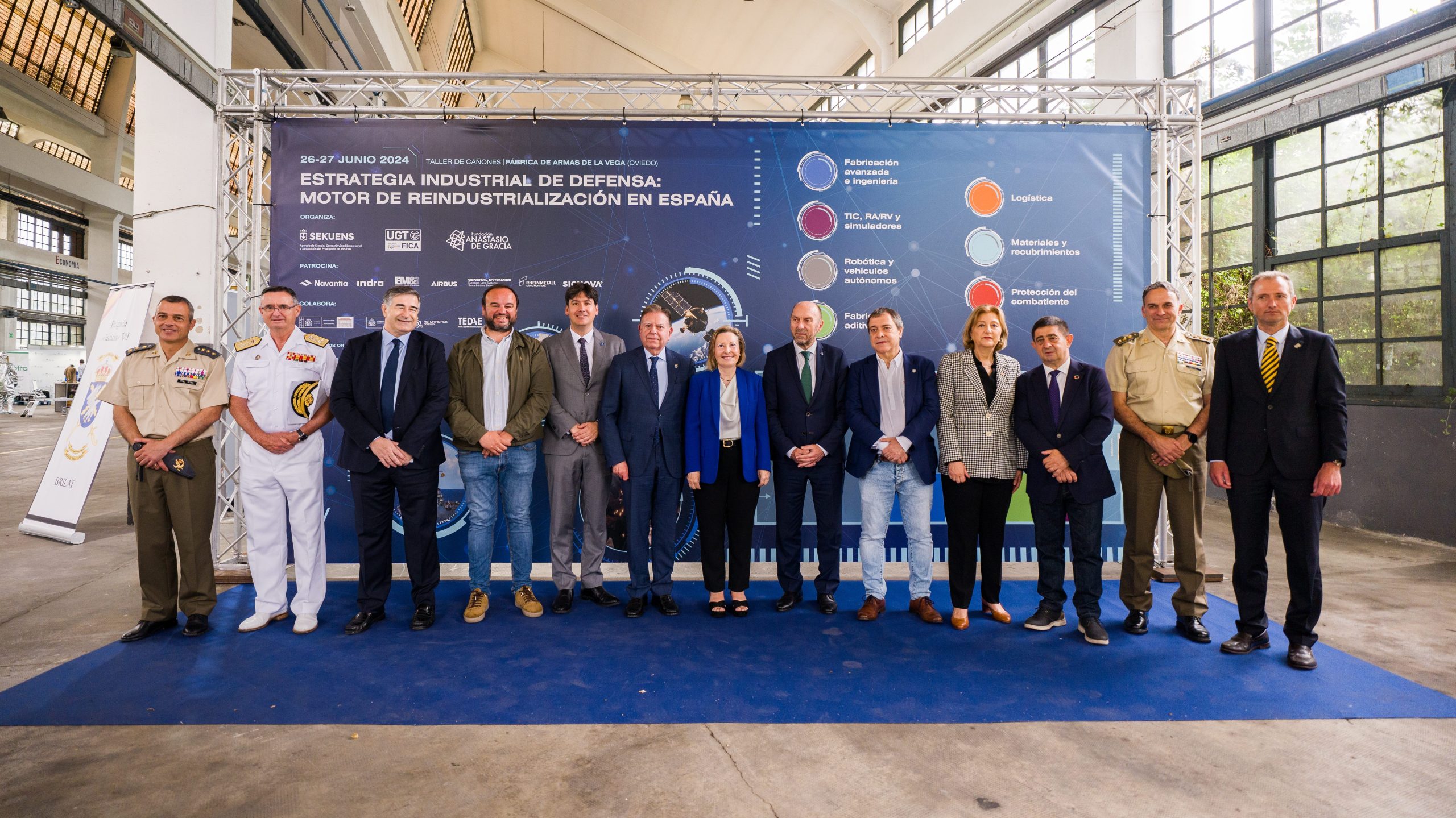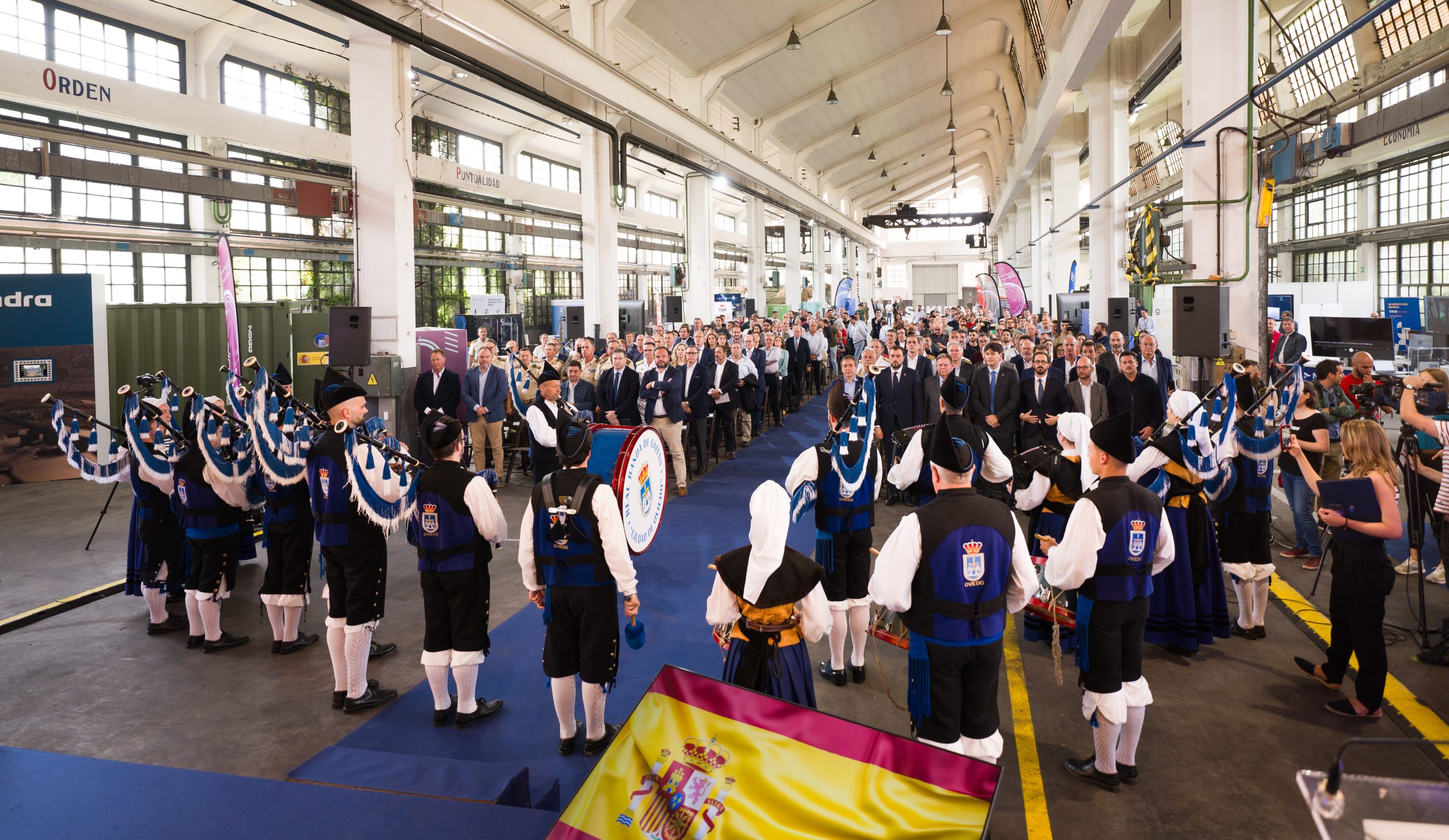On 26 and 27 June, Oviedo hosted the meeting “Defence Industrial Strategy: the engine for the reindustrialisation of Spain”, organised by the Sekuens Agency together with the UGT trade union and the Anastasio de Gracia Foundation. The event closed with a notable turnout of professionals, companies and civilian and military institutions and the launch of several important announcements on investments of the sector in the Principality.

After two intense days of meetings, debates, presentations and demonstrations, the conference “Defence Industrial Strategy: a driving force for the reindustrialisation of Spain” came to a close on Thursday 27 June in the Cannon Building of the “Fábrica de Armas de la Vega” (Oviedo).
And it did so with a positive balance, as the notable success of attendance among companies, professionals, institutions and representatives of national and regional trade union organisations – almost a thousand attendees, speakers and exhibitors between Wednesday and Thursday – was added to the launch of several important news items for Asturias. From the investment plans of several companies in the sector in the region to the announcement by the Ministry of Defence of the development of a new technology centre in the Principality, as well as the official presentation of “Vía Carisa”, an alliance around the industrial corridor that will connect the productive, logistical and innovative hubs of Asturias and Andalusia.
The meeting, in which the Defence Delegation in the Principality of Asturias collaborated as responsible for the management of the transfer of the spaces, aimed to highlight the value of the defence industry in Spain as an important vector of economic growth, employment and innovation, essential for its technological sovereignty and strategic autonomy.
A key event for public-private connection
This event, organised by the government of the Principality, through the Agency for Science, Business Competitiveness and Innovation Sekuens, UGT FICA and the Anastasio de Gracia Foundation, with the collaboration of the Ministry of Defence and the sponsorship of several companies, welcomed more than thirty Asturian and Spanish companies that exhibited a sample of their most cutting-edge technologies. Firms from the region belonging to Asturian Hub Defence such as GDELS Santa Bárbara, ACR Cases, Rodisa, Itemat, Oxiplant, Ingeniacity, Seerstems, Its Safety, Electroniquel, Tor Pinturas, Perimeter Solutions – Auxquimia, Triditive, IDONIAL, SVMAC, Bulbox, Imageryst, Twave, GAM, Icube, Adaro, Svelt, Dogram and Militex coincided in the event with national benchmark companies such as Galeo, Navantia, Rheinmetall Expal Munitions, Escribano or Airbus.
But the conference was also attended by high-ranking representatives of the Ministry of Defence and the Spanish Army, the Spanish Army, the Spanish Air Force and the Spanish Air Force, trade union organisations, and other public institutions and groups of interest for the sector.

La primera jornada, dedicada a las empresas y al desarrollo militar
The president of the Principality, Adrián Barbón, opened the first day by stressing that the Asturian defence industry has a great “pull effect with the capacity to drag” the rest of the economic activities of the community. The companies that sell in this market are not only dedicated to armaments, Barbón recalled, “there are technological solutions, robotics, digital twins, sensors, drones, artificial intelligence…”. On this basis, he added that “the Made in Asturias seal is synonymous with quality”. Barbón highlighted the synergy strategies of the industrial corridors promoted by the Ministry of Defence and pointed out that “it is a question of linking us, north and south, Asturias and Andalusia, in alliance and collaboration to revive our industry and our technological development”.
The opening day was also attended by the Director General of Industrial Programmes of the Ministry of Defence, Jordi Llinares; the Executive Director of the Sekuens Agency, David González; the Mayor of Oviedo, Alfredo Canteli; the General Secretary of UGT in Asturias, Javier Fernández Lanero; the Secretary for Administration and Resources of UGT FICA and trustee of the Anastasio de Gracia Foundation, Félix García and the General Secretary of UGT FICA, Jenaro Martínez.
This was followed by the first of the round tables, dedicated to the “Challenges facing Spanish industry: leadership in the EU’s new defence industrial strategy”. Moderated by César Ramos, General Director of TEDAE, it was attended by Juan Escriña, Executive General Manager of GDELS-Santa Bárbara Sistemas, José Luis Urcelay Verdugo, Chairman of the Supervisory Board of Rheinmetall Expal Munitions, Ricardo Domínguez, President of Navantia, Ángel Escribano, CEO of Escribano Mechanical & Engineering, José Vicente de los Mozos, CEO of Indra and Fernando Lombo, CEO of Airbus Helicopters Spain.

The second of the day’s round tables, entitled “New investment cycle: towards obtaining the necessary military capabilities”, was moderated by Benjamín Carrasco, editor of Infodefensa, and was attended by Aniceto Rosique Nieto, Admiral, Director General of Armaments and Material, Fernando García González-Valerio, Lieutenant General of the Army, Chief of the Joint Defence Staff, and José Luis Sánchez Martínez, Major General of the Air Force and Director General of Economic Affairs of the Secretary of State for Defence.

Two major announcements with investments in Asturias
This first day also saw the launch of two important announcements for the region. The Escribano Group, one of the giants in the national armaments industry, assured that it will set up one of its engineering plants in Asturias through the words of its president, Ángel Escribano. And he postponed the definitive presentation of the project until September.
This good news was added to that of Admiral José Luis Urcelay, president of Rheinmetall-Expal Munitions, who commented that they currently have 300 people working at their Trubia plant, but hope to reach 350 before the end of the year.

A new defence technology centre in Asturias
The protagonist of the second day was Amparo Valcarce, Secretary of State for Defence of the Spanish Government, who in her speech “The New Defence Strategy: Challenges and Opportunities” announced that Asturias will host a new defence-related technology centre. This facility will be linked to the Tess Defense consortium, made up of Santa Bárbara Sistemas, Indra, Sapa Placencia and Escribano. In this way, Valcarce emphasised, not only will manufacturing be promoted, but also technological development, training and the attraction of talent.

An investment that adds to the already announced awards of several contracts to Santa Bárbara that have ensured the workload of the Trubia factory. Among them, the manufacture of the 8×8 Dragon wheeled combat vehicle (RCV) and the autonomous tracked vehicle (ACV). The planned investment in actions related to the defence industry amounts to 5 billion.
“It is very important from a strategic point of view for the Principality, because it will mean the creation of technological jobs and training in engineering and applied research,” stressed Borja Sánchez, the Principality’s Councillor of Science. The new technology centre opens up the possibility for Asturias to be “in a paradigm shift and in an investment cycle at the right time, we are at the starting line just like the rest of the communities and we have to incorporate not only manufacturing but also innovation, so that these products give rise to other products,” he said.
“Vía Carisa”, an industrial corridor for development
The second day also saw the presentation of the Vía Carisa initiative, a new corridor for the defence industry in Spain linked to the Silver Route and promoted by an alliance of the chambers of commerce of Oviedo and Linares and the technology parks of Asturias and Jaén. A “fourth corridor” that will connect the North and South through the traditional Silver Route, a first stone in the consolidation of this industrial axis, linking industries on both sides of the country, opening offices, organising trade fairs and adding Extremadura and Castilla y León.
The presentation ceremony was attended by Ángel Llavero, director of Meltio; the president of the Oviedo Chamber of Commerce, Carlos Paniceres; his counterpart in Linares, María Jere; the councillor Borja Sánchez; Francisco Reyes, president of the Provincial Council of Jaén, and David González, director of Sekuens.
All of this was accompanied by two other round tables. The first, “Society and training: an opportunity to generate employment, attract industry and strengthen territorial cohesion” was moderated by Paco Herranz, director of IndustryTalks, with the participation of José Bayón, director general of the School of Industrial Organisation (EOI), Rocío Cachero, director of Dogram, Francisco Quereda, CEO of ISDEFE, Ángel Llavero, CEO of Meltio and Juan Antonio Vázquez, secretary for industrial policy of UGT FICA.
In the second, “Innovation and Technology Transfer moving towards strategic autonomy”, moderated by Carlos Paniceres Estrada, president of the Oviedo Chamber of Commerce, participated Enrique Campo Loarte, general division, deputy director general of planning, technology and innovation of the DGAM, Borja Sánchez García, minister of Science, Business, Training and Employment of the Principality of Asturias, Juan Antonio Tébar, director of EU programmes and Territorial Cooperation of CDTI and Paula Queipo, secretary of the Defence Hub in Asturias and business director of Idonial.



















